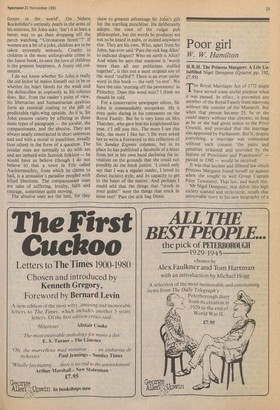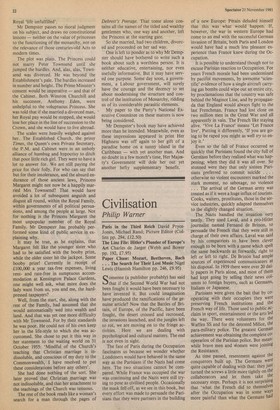Poor girl w. W. Hamilton H.R.H. The Princess Margaret: A
Life Unfulfilled Nigel Dempster (Quartet pp. 192, £.7.95) rr he Royal Marriages Act of 1772 might have served some useful purpose when it was passed. In effect, it prevented any member of the Royal Family from marrying without the consent of the Monarch. But when that person became 25, he or she could marry without that consent, so long as he or she had given notice to the Privy Council, and provided that the marriage Was approved by Parliament. But if, despite everything, a marriage was solemnised without such consent 'the pains and penalties ordained and provided by the Statute of Provisions and Praemunire' — passed in 1392 — would be incurred.
It was that ancient and illiberal law which Princess Margaret found herself up against when she sought to wed Group Captain Peter Townsend. That law, and much else.
Mr Nigel Dempster, that delver into high society scandal and tittle-tattle, recalls that memorable story in his new biography of a Royal 'life unfulfilled'.
Mr Dempster passes no moral judgment on his subject, and draws no constitutional lessons — neither on the value of princesses to the functioning of the monarchy, nor on the relevance of those centuries-old Acts to modern times.
The plot was plain. The Princess could not marry Peter Townsend until she jumped the hurdles. And, alas, alas, Townsend was divorced. He was beyond the Establishment's pale. The hurdles increased in number and height. The Prime Minister's consent would be imperative — and that of the Cabinet. Both Winston Churchill and his successor, Anthony Eden, were unhelpful to the voluptuous Princess. She was told that if she married a divorced man, her Royal pay would be stopped, she would lose her place in the line of succession to the Crown, and she would have to live abroad.
The scales were heavily weighed against her. The Established Church, the prissy Times, the Queen's own Private Secretary, the P.M. and Cabinet were in an unholy alliance of humbug and hypocrisy to ditch that poor little rich girl. They were to have a lot to answer for. We are still paying the price for their folly. For who can say that but for their intolerance, and the absurd endurance of those ancient laws, Princess Margaret might not now be a happily married Mrs Townsend? That would have avoided a lot of subsequent anguish and disgust all round, within the Royal Family, within governments of all political persuasions, and among the people at large. Not for nothing is the Princess Margaret the most unpopular member of the Royal Family. Mr Dempster has probably performed some kind of public service in explaining why. It may be true, as he explains, that Margaret felt like the younger sister who had to be satisfied with the booby prize, while the older sister hit the jackpot. Some booby prize! Currently in receipt of £100,003 a year tax-free expenses, living rentand rate-free in sumptuous accommodation at Kensington Palace Gardens, one might well ask, what more does the lady want from us, you and me, the hardpressed taxpayers?
Well, from the start, she, along with the rest of the Family, had assumed that she would automatically wed into wealth and land. And that was yet one more difficulty with Mr Townsend. For by their standards he was poor. He could not of his own keep her in the life-style to which she was accustomed. She chose to put it this way in her statement to the waiting world on 31 October 1955: 'Mindful of the Church's teaching that Christian marriage is indissoluble, and conscious of my duty to the Commonwealth, I have resolved to put these considerations before any others'.
She had done nothing of the sort. She later proved that Christian marriage was not indissoluble, and that her attachment to the teachings of the Church was tenuous.
The rest of the book reads like a woman's search for a man through the pages of Debrett's Peerage. That tome alone contains all the names of the titled and wealthy gentlemen who, one way and another, left the Princess at the starting gate.
So she married, had two children, divorced and proceeded on her sad way.
One is left to ponder as to why Mr Dempster should have bothered to write such a book about such a worthless person. It is neither educative, entertaining, nor even usefully informative. But it may have served one purpose. Some day soon, a government, a Labour government, will surely have the courage and the decency to set about modernising the structure and control of the institution of Monarchy, ridding us of its considerable parasitic elements.
My paper to the Party's National Executive Committee on these matters is now being considered.
Mr Dempster's book may have achieved more than he intended. Meanwhile, even as these impressions appeared in print Her Highness was off again to her gift of a paradise home on a sunny island in the Caribbean — with yet another man. And no doubt in a few month's time, Her Maje6ty's Government will dole her out yet another hefty supplementary benefit.











































 Previous page
Previous page